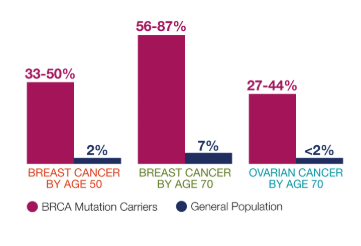BRCA1 and BRCA2 Screening
BRCA1 and BRCA2 are human genes that produce tumor suppressor proteins. These proteins help repair damaged DNA and play a role in ensuring the stability of the cell’s genetic material. When either of these genes is mutated or changed, DNA damage may not be repaired properly. As a result, cells are more likely to develop additional genetic alterations that can lead to cancer.
BRCA1 and BRCA2 testing are recommended when a person’s individual or family history suggests the possible presence of a harmful mutation.
The Importance of BRCA1 and BRCA2 Screening
Specific inherited mutations in BRCA1 and BRCA2 increase the risk of breast and ovarian cancers and have been associated with increased risks of several other types of cancer. Together, BRCA1 and BRCA2 mutations account for approximately 20-25% of hereditary breast cancers and almost 5-10% of all breast cancers. Mutations in BRCA1 and BRCA2 account for nearly 15% of ovarian cancers overall. Breast and ovarian cancers associated with BRCA1 and BRCA2 mutations tend to develop at younger ages than cancers not associated with the mutations.
A harmful BRCA1 or BRCA2 mutation can be inherited from a woman’s mother or father. Any child of a parent who carries a mutation in one of these genes has a 50% chance of inheriting the mutation. A woman’s lifetime risk for developing breast and/or ovarian cancer is greatly increased if she inherits a harmful BRCA1 or BRCA2 mutation.
Important Risk Factors Include:
- Breast cancer diagnosed before age 50
- Cancer in both breasts in the same woman
- Ovarian cancer at any age
- Multiple breast cancers
- 2+ primary types of BRCA1 - or BRCA2 - related cancers in a single family member
- Ashkenazi Jewish ethnicity
- Male breast cancer

What are the benefits of BRCA1 and BRCA2 genetic testing results?
- Demonstrate that your children are not at risk of inheriting the BRCA1/BRCA2 gene mutation
- Avoid the need for special checkups, tests or preventive surgeries
- Help make informed decisions about your future, including taking steps to reduce cancer risk
- Allow participation in medical research that could help reduce deaths from hereditary breast and ovarian cancer
